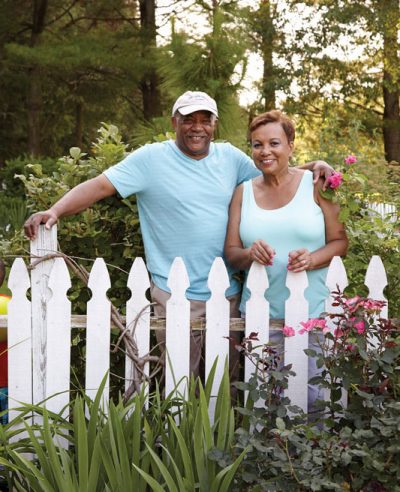
Ruthann and Daine Grey were ready for a new challenge. Their children were grown, and their busy suburban lifestyle was becoming a bit of a grind. So 10 years ago, they sold their condo in Watchung and started a new chapter on a 4 ½-acre spread in Hunterdon County.
It happened quite by chance. Taking a drive one day, the Greys discovered a neglected property for sale along a winding country road in Readington Township. The dark, cramped, ranch-style house and weed-filled acreage needed a major overhaul. “It had been sitting there neglected for 30 years,” says Ruthann. The pair hired a builder to renovate the rundown structure, creating a modernized, window-filled home. “We spent a lot of money and time making it our own,” Ruthann says. But it was the transformation of the land that truly revealed the couple’s heart and soul.
Ruthann’s previous gardening experience was limited to a 10-by-20-foot plot of soil at the condo. “We had no sense of what it was going to take to transform this land,” she says. “I don’t want to sound dumb, but we had no idea what we were taking on.”
Leaving behind a 25-year career in corporate communications (she is now retired from her consulting firm), Ruthann immersed herself in gardening. The learning curve was steep. “I took a course at the New York Botanical Gardens and attended a master gardening program at Rutgers University,” she says. “I spend hours and hours on the computer researching plants.”
Together, the couple started attending plant auctions. “It became what we did on weekends,” she says. Often, they came home with 30 shrubs in their pickup truck. Ruthann joined gardening clubs and horticulture societies, keen to network with other members to learn more.
When not researching, the couple worked tirelessly. With Daine as her right-hand man, Ruthann dug and carted and planted. “Every single shrub, bush and flower, all the grasses, we brought it in—everything except the property’s many old trees,” she says. The couple used their pick-up to haul in load after load of stones. “We dug the pathways, edged the pathways, put the plastic down and shoveled the stones in the pathways,” she says.
The garden developed slowly, with mistakes along the way. “I’m sure that a third of what I planted died,” Ruthann says. The first season, deer ate every single azalea. That fall, Daine, a college professor who enjoys woodworking, built a fence around the 4½-acre perimeter, then another fence around each individual garden. “If you want a lush garden in Hunterdon County, you really need to fence it in,” Ruthann says. She eventually discovered hellebores, a hosta-like plant that deer won’t eat. She planted hundreds of them.
Ruthann also learned that creating her own soil makes a big difference. Mixing native soil with sand and peat moss, and in subsequent years, compost, she put down rich, fertile beds. “With the compost, I don’t need much fertilizer,” she says.
Daine, meanwhile, dug trenches and put in underground pipes that lead to eight separate sprinkler stations scattered around the yard. He also built the sheds and garden archways. “Whatever she wants built,” he says, “I build.”
Ruthann says it requires about 10 years to achieve a mature, lush garden with wonderful plants and flowers. “It takes patience,” she says. “It took me years to understand how the sun came into the garden.” Even now, Ruthann is still learning and enjoying every minute. “I actually work out here every single day, March to November,” she says. “I’m very happy with the solitude and the peace part of it.”
Says Daine, “I would not be exaggerating if I say that when I leave for work in the morning, Ruthann is outside. When I come home, she is still outside.”
The Greys often marvel at the change in their lives. “We were all about museums and jazz clubs. We were very oriented to the city,” Daine says. “Then we made the decision to come to the country. I think that stepping out of our comfort zone has been the most enriching experience of our lives.”
Country living also gets the thumbs up from Ruthann and Daine’s six grandkids. “It’s such a pleasure to have the grandkids visit,” says Ruthann.
“It’s been a powerful transition,” adds Daine. “I have a wider perspective of what people can do. It doesn’t always have to be lights, camera, action. It can be sitting on a stump and enjoying the birds.”



